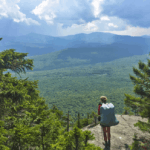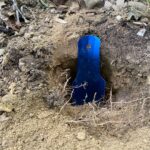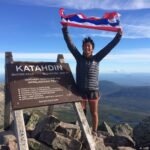Planning a Day Hike
Trying to plan a single hike on a 2,000+ mile trail can be intimidating! Here’s everything you need to know to plan your next (or first) day hike or backpacking trip. We break down types of hikes you can take on the A.T. (including some inn-to-inn hike options) and suggest questions to ask to help narrow down where you want to go.

How Do I Find Great Day Hikes?
Once you know what kind of hike you’re looking for – from a short day hike to an overnight trip – how do you pick where to go? Learn how to find great A.T. hikes and the best resources for picking your route.
Find a Hike
Day Hike Prep
Use our Day Hike Checklist to remember everything you need for a safe and fun hike on the A.T.!
Day Hike ChecklistWhen is a good time to hike?
Conditions vary a lot along the A.T. depending on the season and recent weather. While spring can be a lovely time to hike in the Mid-Atlantic, frigid temperatures can persist in New England. Similarly, the heat in Virginia can be oppressive in July while cooler weather makes for great hiking in New Hampshire. Learn about what weather to expect when and where along the Trail to help plan your trip.
Best Times to Hike
A.T. Hike Rating Scale
When choosing a day hike on the Trail, it’s important to consider your hiking experience, along with the weather and supplies needed to have a safe and enjoyable outing. Our hike ratings scale will help you identify sections of the A.T. that best fit your abilities and gear.
Rating Scale

Safety on the A.T.
Learn about the hazards you may face when hiking the Appalachian Trail and how to best prepare for a safe, healthy hike.
SafetyBackpacking Resources
Multi-day hiking, or backpacking, means camping along the A.T. and hiking from campsite to campsite. Backpacking the A.T. can mean spending one night on the Trail or tackling long sections that take multiple weeks to complete. Those who backpack the A.T. with the intent to complete the entire Trail in more than 12 months are called section hikers. Those who intend to backpack to complete the entire Trail in 12 months or less are called thru-hikers.
Interested in completing the entire Trail? Check out our Thru & Section Hiking pages.
What to Expect on a Multi-Day Hike
While backpacking a part of the A.T. is not as intimidating as thru-hiking, it takes more commitment than day hiking. It requires more preparation, equipment, food, clothing and knowledge of Trail regulations and backcountry skills. Planning is crucial to a successful multi-day hike, so be sure to check out the essential skills portion of our website.
Expect to get dirty and sweaty, and expect your pack to be heavier than if you were just out for a day. If you’ve never backpacked before, we recommend going out for just one or two nights at first in an area with relatively mild terrain. If possible, stick close to home. We also recommend keeping your daily mileage between trailheads and campsites lower; around five to eight miles. This will give you the chance to experience what its like to carry a full pack for a day while not overextending yourself and risking injury (or risking simply not having fun!).
No matter how long you’re backpacking trip will be, it’s critical to learn some A.T. basics and essential Trail skills to stay safe and leave as little impact on the Trail as possible. We also recommend registering your hike to help reduce overcrowding on the A.T. and receive urgent Trail Alerts.
RegisterAbout Section Hiking
A section hiker completes the A.T. in a series of multi-day trips over a period of years. This method allows hikers to enjoy all the A.T. has to offer without making some of the sacrifices required for a thru-hike. Section hikers are considered 2,000-milers.
Advantages:
- Choose your own pace and mileage.
- See more of the Appalachian countryside and small towns during your travels to and from the A.T.
- Choose your favorite time to enjoy each section, catching spring wildflowers or fall colors, and avoiding crowds, insects and extreme temperatures.
- There’s no need to quit your job to find the time to hike.
- You can spread out expenses over time; there’s no need to save up a big bundle.
Disadvantages:
- If you backpack short sections, you’ll find you’re just getting in good shape as it’s time to go home, and you have to break in each time anew.
- Traveling to and from the A.T. from home multiple times adds to overall expenses.
- Public transportation can be scarce along the A.T. (bus stations and airports can be many miles away from where the hiker begins or ends a trip).
Quick Tip
Although you may tackle the A.T. in any order you wish, we advise that you don’t start with New Hampshire and Maine. These two northern states are much more rugged and challenging than other parts of the Trail and can be difficult for both beginners and veteran hikers.
Thru & Section HikingCamping & Shelters
Whether you’re pitching a tent or staying at one of the 250+ backcountry shelters along the Trail, it’s important to follow regulations and minimize your impact on the environment.
Camping & SheltersPermits & Feeds
Some parts of the Trail require an entrance fee and permit, and some places require fees for camping.
Permits & FeesParking & Transportation
Learn where you can access the Trail, where you can leave your car while you hike, essential trailhead safety tips, and public transportation options along the A.T.
Learn MoreTrail Updates
Know before you go — be aware of the latest Appalachian Trail conditions, weather advisories, and reroutes/closures.
Trail UpdatesThe A.T. Ethic: Hiking Sustainably



14 State Challenge
The 14 State Challenge is a great way to visit some of the A.T.’s most iconic places in bite-sized pieces! Tackle the goal of visiting at least one spot along the Trail in all 14 states to get your 14 State Challenge certificate.
14 State Challenge
Louisa Corallo
Report a Successful Hike of the Entire Appalachian Trail
Section hikers and thru-hikers who complete the entire A.T. can report their journeys to us by filling out the 2,000-miler application. Those who submit their applications will be added to our roster of 2,000-milers and will receive a certificate of recognition, an A.T. patch, an accompanying 2,000-miler “rocker” patch, and be featured in the Spring issue of A.T. Journeys magazine.
About 2,000-Miler Applications

